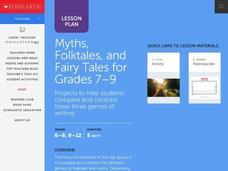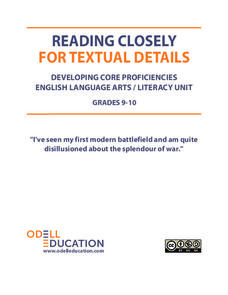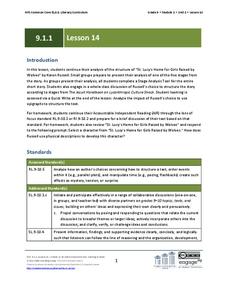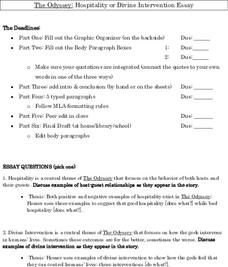Great Books Foundation
I Shall Not Beg for My Rights
An excerpt from Henry MacNeal Turner's address to the Georgia legislature provides class members with an opportunity to develop their literary analysis skills. Prompted by the provided factual, evaluative, and interpretive questions,...
EngageNY
Grade 9 ELA Module 1, Unit 1, Lesson 11
Address annotation, word choice, and tone in the same language arts instructional activity. Ninth graders read a section of Karen Russell's "St. Lucy's Home for Girls Raised by Wolves" and track character development based on supporting...
EngageNY
Grade 9 ELA Module 1, Unit 1, Lesson 12
Finding the central idea in a text can be as simple as deciphering the correct pieces of supporting evidence. As your class reads Stage 4 of "St. Lucy's Home for Girls Raised by Wolves" by Karen Russell, they analyze the interactions...
EngageNY
Grade 9 ELA Module 2, Unit 2, Lesson 17
As Oedipus the King approaches its tragic conclusion, high schoolers discuss Oedipus' reaction to seeing his wife's body. They also examine how Sophocles structures the scene to contribute to the central idea of his play.
E Reading Worksheets
Tone Worksheet 4
A poet's word choice can be the difference between a poem that is merely sad, and a poem full of heartbreaking regret. Middle schoolers discern the tone in four different poems, noting the relevant textual evidence that supports each...
E Reading Worksheets
Tone Worksheet 5
A speaker's attitude toward his or her subject matter determines the tone of a piece of literature. Interpret the tone of four different poems, as well as their meanings, with supporting textual details.
Curated OER
To Kill a Mockingbird: End of Novel Critical-Thinking Questions
Chapters 28 – 31 of Harper Lee’s To Kill a Mockingbird are the focus of a series of critical thinking questions. Responders are encouraged to refer directly to the novel to support their inferences and interpretations.
Teacher’s Pet Publications
A Common Core Approach to Teaching Of Mice and Men
Whether or not your school/state has adopted the Common Core standards, you will want to add this resource to your Of Mice and Men curriculum materials. The chapter-by-chapter activities ask readers to provide evidence from the novella...
Great Books Foundation
Discussion Guide for Little Women
Start with the question in mind with a discussion activity on Louisa May Alcott's Little Women. With four focus questions, note-taking prompts, and discussion points, readers practice answering thematic questions based on textual evidence.
Soft Schools
Practice with Poetry
William Shakespeare's Sonnet 138 is the focus of a reading comprehension exercise that asks readers to answer to five questions using evidence drawn from the poem to support their response.
La Jolla High School
Of Mice and Men by John Steinbeck: Sketching a Portrait--Character Traits
Use this handout to focus on the character traits of George and Lennie in John Steinbeck's Of Mice and Men. Readers are given a set of specific traits to search for in the first chapter. They are required to list two textual examples of...
Novelinks
The Adventures of Tom Sawyer: Writing Assignment
Ask learners to focus on one scene in Mark Twain's The Adventures of Tom Sawyer in order to write an analytical essay about Twain's ideas surrounding childhood. The final assignment in a unit, this writing prompt requires learners to use...
Scholastic
Myths, Folktales, & Fairy Tales for Grades 7-9
Here is a must-have resource for studying fairy tales, myths, and folktales with your class! It includes instructional ideas, activities, and materials to support a month-long review of these three unique genres of writing.
National Endowment for the Humanities
Themes in Lord of the Flies
William Golding's Lord of the Flies is the anchor text for a lesson that teaches readers how to distinguish between a literary topic and a literary theme. Using the provided worksheets, groups first chart some themes and propose a...
K20 LEARN
"The Lady, Or The Tiger?" Which Do You Choose?: Internal and External Conflict
"How come there's no ending?" After a close reading of Frank R. Stockton's tale "The Lady, or the Tiger?" in which scholars examine each of the main characters' conflicts and motivations, writers craft their own ending using textual...
Odell Education
Reading Closely for Textual Details: Grades 9-10
Pay close attention! After finding details in a picture, scholars begin to find details in videos and text. They work together in groups, discuss in pairs, and carry out independent reading to answer guiding questions. Organizers, tools,...
EngageNY
Grade 10 ELA Module 4: Unit 2, Lesson 6
What decisions might an author make about the structure of a play? Pupils participate in an evidence-based discussion about Shakespeare's choices in Macbeth. Next, scholars analyze the effect of Shakespeare's structural choices in Act 2,...
Stockton University Wordpress
Civil Disobedience: Is it ever ok to break the law?
As part of a study of civil disobedience, class members read excerpts from the writings of activists who were willing to break the law to protest unjust laws.
K12 Reader
Setting the Scene: Great Expectations
Expect great things from this reading comprehension exercise that asks readers to cite evidence from the provided passages of Great Expectations to support the inference that Charles Dickens' Miss Havisham, and her room, are indeed strange.
EngageNY
Grade 9 ELA Module 1, Unit 1, Lesson 7
A story about feral girls raised by werewolves will have some interesting character development! Track how the girls and their teachers act, speak, and change with a lesson focused on Karen Russell's "St. Lucy's Home for Girls Raised by...
EngageNY
Grade 9 ELA Module 1, Unit 1, Lesson 14
Karen Russell's short story "St. Lucy's Home for Girls Raised by Wolves" has a unique structure that adds value to the story. With the fourteenth activity in a unit about literary analysis and textual support, analyze how Russell has...
College Board
2008 AP® English Language and Composition Free-Response Questions
Are your high school scholars ready for college?
Administering the 2008 AP® English Language and Composition Free-Response
Questions tells much about a
pupil's readiness for high level English courses. The resource offers three
questions...
Curated OER
The Odyssey: Hospitality or Divine Intervention Essay
Conclude a study of The Odyssey with a writing assignment that asks readers to investigate a central theme in Homer's tale. Scholars either provide positive and negative examples of hospitality or look for evidence of how the gods...
Curated OER
Shizuko’s Daughter: Discussion Web
Is Yuki a selfish character? Analyze her motivation and behavior during a unit on Shizuko's Daughter by Kyoko Mori. Readers fill out two sides of a graphic organizer with reasons why or why not she is selfish, and then come up with a...

























